With news on: Recycling grows in East Devon; Brighton and Hove council investigate recycling ‘error’; Eunomia reviews National Trust’s waste strategy; University of Birmingham launches rare earth metal project; Sims Recycling Solutions to Plant 2,000 Trees. Reporting by Lucy Lewin.
East Devon hails recycling rate growth
East Devon council has claimed that its residents are the best recyclers in their county, after the Devon borough achieved a 59% recycling rate.
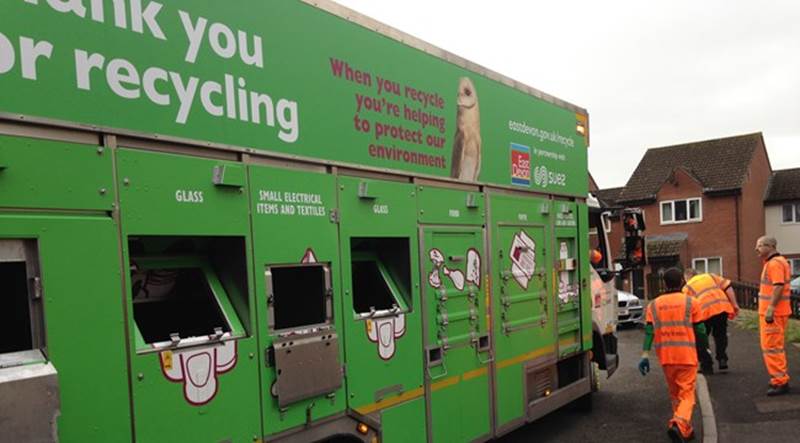
Recycling workers in East Devon
Annual figures from Devon county council indicate that the district’s recycling rate has increased by 5% in 12 months, and 13% over two years.
The council rolled out changes to its recycling service, covering 70,000 households, alongside its contractor Suez in June 2017 switching from collecting residual waste every fortnight to collecting waste every three weeks and collecting recyclables and food waste collected weekly.
Commenting on the latest figures, Geoff Jung, East Devon District Council’s portfolio holder for the environment said: “Huge credit must go to all involved, including our recycling team, councillors and contractors Suez, in helping recycle such a high proportion of our domestic waste.
“These recycling items are a valuable resource which once processed are used as raw materials for manufacturing or as compost for our farmers. It’s a clear contribution to a circular economy and contributes to our zero-carbon target.”
Brighton and Hove council investigates recycling ‘mix-up’
Brighton and Hove City council has carried out an investigation after a small amount of waste collected from the beach during the city’s Pride celebration was not recycled.
A mix-up by Cityclean staff, the council’s waste and recycling service, led to several bags containing tin cans being sent to an energy recovery facility in Newhaven rather than being recycled, the council claimed.
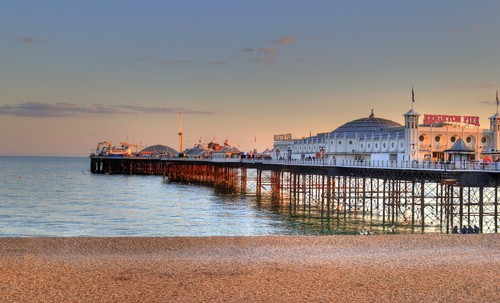
Volunteers collected recycling that had been littered on Brighton beach
The cans had been collected on the beach by volunteer groups throughout the weekend.
It was initially thought all recycling from the beach – including glass, paper and recyclable plastics – was taken to the energy recovery facility, however the investigation clarified that only tin cans had been involved in the mix up.
Rachel Chasseaud, assistant director for City Environment, said: “We launched an immediate investigation into what went wrong. We can only hold our hands up and say this was a human error which should never have happened.
“We apologise to every person who volunteered their valuable time to collect the cans from the beach. These hard-working people did the right thing, unfortunately we didn’t.”
Cityclean collected a total of 67 tonnes of waste – both recycling and rubbish – over the Pride Weekend that was all disposed of correctly.
Eunomia reviews National Trust’s waste strategy
The National Trust has commissioned environmental consultancy firm Eunomia to review approaches towards single-use packaging and waste prevention across several of its properties.
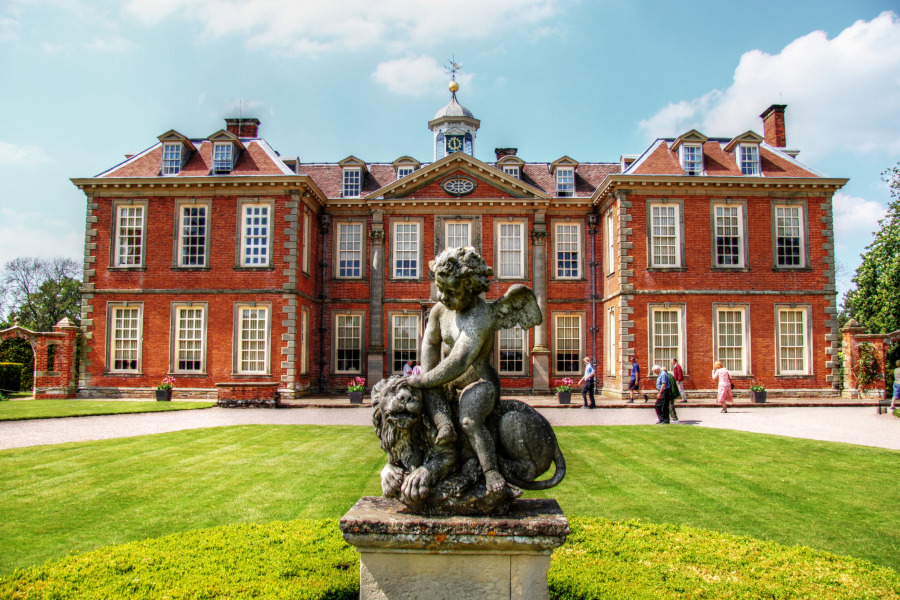
The National Trust wants to reduce its reliance on single-use packaging
Visits to three National Trust properties in different settings, involving consultations with procurement, waste operations, and food and beverage staff, allowed the firm to deliver an action plan for enabling the National Trust to bring in beneficial changes on both an individual property and organisation-wide basis.
Recommendations included offering free water refill points at every property; stopping the use of disposables for eating-in; including a small charge for customers using disposable cup, as well as a discount for those using reusable cups; and replacing plastic-window takeaway bags with 100% paper bags to allow recycling.
Alice Johnson, who worked on the project, said: “As organisations become more aware of the consequences of single-use plastics, they are increasingly looking for suitable packaging replacements. However, this is not as simple a process as it may seem. An evidence-based approach is needed to avoid knee-jerk reactions which may result in greater environmental impacts.”
University of Birmingham launches rare earth metal recycling project
The University of Birmingham has been awarded €4 million to set up a pilot facility for reclaiming rare earth metals from scrap.
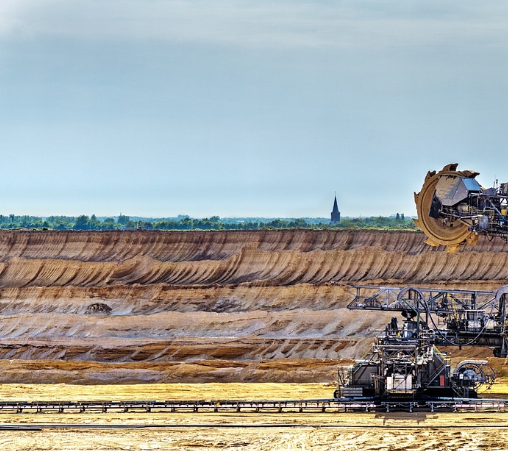
Mining for rare earth metals, which are in high demand
The funding comes as part of the EU-funded Horizon 2020 project SUSMAGPRO (Sustainable Recovery, Reprocessing and Reuse of Rare-Earth Magnets in a Circular Economy).
The new facility will recycle magnets made of neodymium, boron and iron. These are commonly found in items such as hard disk drives, household appliances, electric vehicles and wind turbine generators.
China produces around 80% of the world’s rare earth metals, however less than 1% of these are currently recycled – presenting an exciting circular economy opportunity.
The grant will fund the development of a complete European supply chain that can produce 20 tonnes of recycled magnets annually.
A robotic sorting line at Tyseley Energy Park in Birmingham will separate the rare earth magnets from scrap and metal alloy powders will be extracted and used to manufacture recycled magnets at plants in the UK and Europe.
Professor Allan Walton, from the University’s School of Metallurgy and Materials is one of the technique’s pioneers. He commented: “Rare earth magnets are used in practically every application that uses electricity to produce motion and underpin industries that are worth more than £1 trillion worldwide. However, both the price and supply have fluctuated considerably over recent years.
“This means there is considerable opportunity for cost-efficient technologies, which make recycling viable in the long-term.”
Sims Recycling Solutions to Plant 2,000 Trees
Sims Recycling Solutions (SRS), a provider of IT asset disposition and electronics recycling solutions, has committed to planting 2,000 trees in Europe and Uganda as part of an effort to offset carbon emissions from its logistics services.
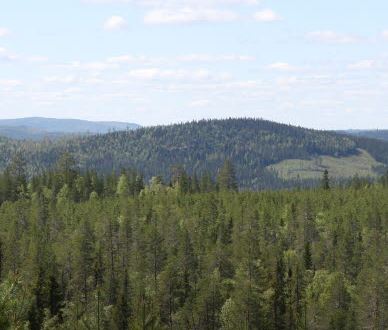
The project aims to plant 2,000 trees
The company has recognised the damaging effects of deforestation, partnering with The Trees for All foundation, a Netherland’s based organisation focused on preventing deforestation and assisting businesses in compensating for their carbon emissions.
The collaboration will oversee the planting of 1,000 trees in the Netherlands and 1,000 trees in Uganda’s Kibale National Park, which was selected due to its elevated vulnerability to deforestation and high level of species diversity.
The project is set to be completed before the end of the 2019 calendar year and is expected to positively contribute to three of the UN’s global sustainable development goals, which include the reduction of poverty in developing countries, the reduction of global climate change and a contribution to restoring the ecosystem and retaining biodiversity.
The post News in Brief (08/08/2019) appeared first on letsrecycle.com.
Source: letsrecycle.com Plastic


